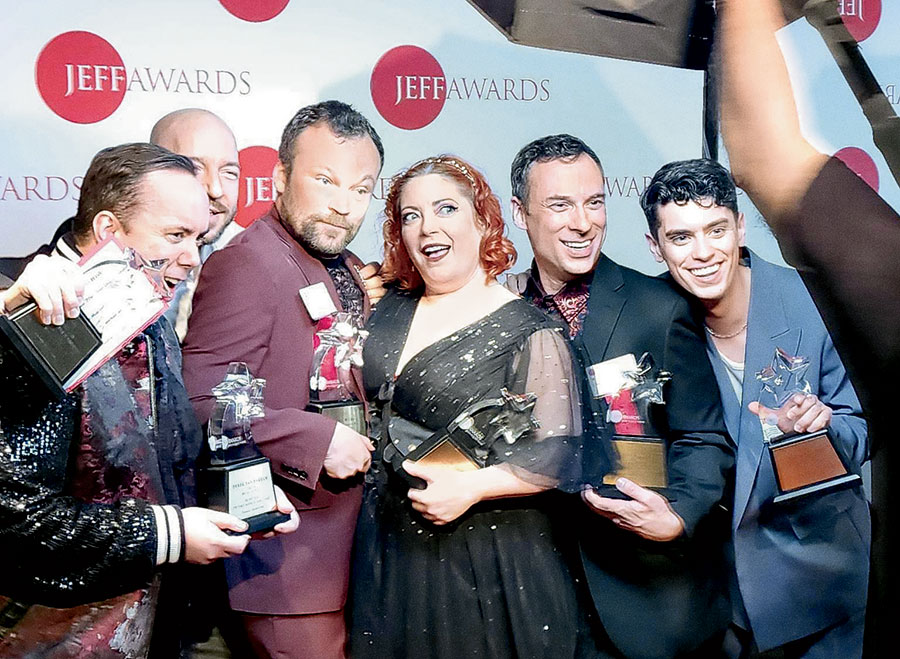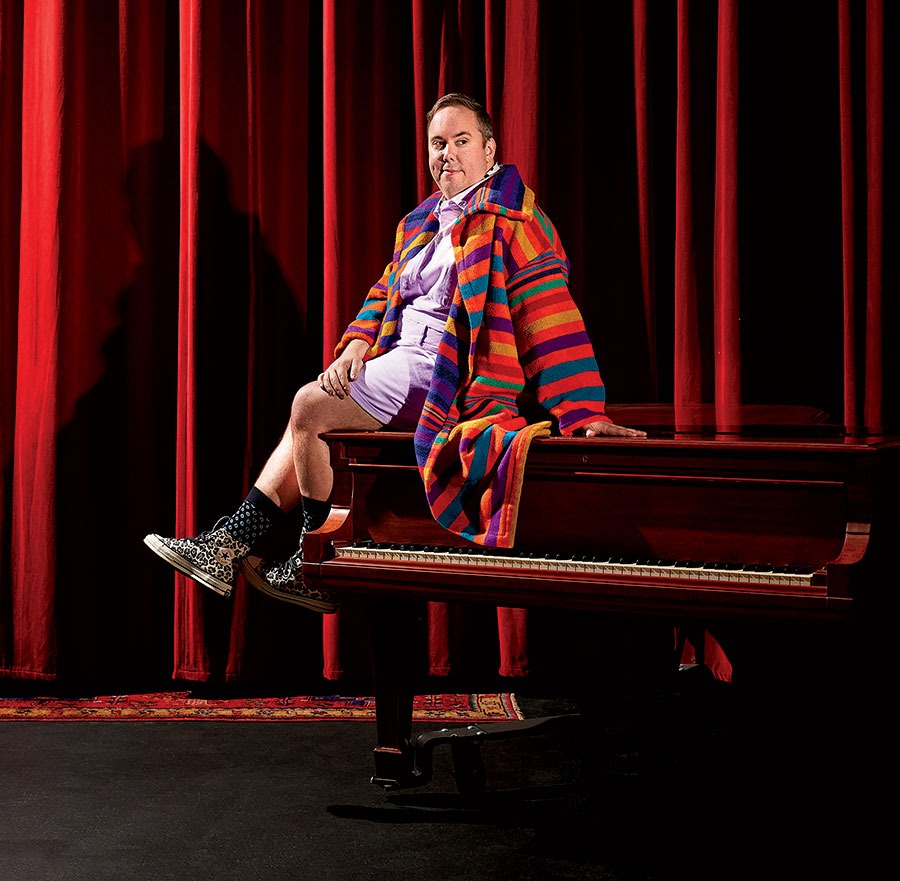Back in 2016, if you were lucky enough to catch the world premiere of The SpongeBob Musical downtown, you were treated to an oceanful of Tony-winning stagecraft — including the titular hero scaling a menacing volcano, represented by an enormous arrangement of interlaced ladders. Achieving that effect presents quite a challenge for a storefront theater like Kokandy Productions, which staged a small-scale version this summer.
“When SpongeBob climbs the volcano, this giant ladder structure flies down from the sky. Well, what sky? We’re in the Chopin Theatre basement — the moment you stand on a chair here, your head is right under the stage lighting,” says JD Caudill, who directed the Kokandy production. “How do we climb a volcano when we literally cannot climb? We had to come up with creative solutions.” Their answer: sending SpongeBob (and besties Patrick and Sandy) along a horizontal obstacle course made of toys.
Such inventiveness has become a Kokandy signature: sheer imagination mixed with moxie. Last fall, for the company’s triumphant Sweeney Todd, instead of a two-floor tonsorial parlor and meat pie emporium, its designers built a turntable on which most of the action took place. At key moments, the chorus would turn the circular stage while intoning, “Lift your razor high, Sweeney,” twisting the audience’s perspective along with our antihero’s decaying morality.
That production, which combined with Cruel Intentions for a diabolical twofer of a 2022 season, became Kokandy’s biggest hit and earned six Jeff Awards in non-Equity musical categories — nearly half of the 11-year-old company’s cumulative total of 14. Kokandy is parlaying that momentum into a similarly wild 2023 season. It will follow SpongeBob, which wraps September 3, with American Psycho, a Duncan Sheik tuner (and notorious Broadway flop) adapted from the Bret Easton Ellis novel. That production runs September 14 to November 26.
If it seems bizarre to pair a family-friendly pop-rock musical based on a beloved cartoon with a darkly satirical show about a serial killer, well, “I kind of love the tonal whiplash,” says Derek Van Barham, Kokandy’s producing artistic director. “When I told my husband the idea, he said, ‘That’s psychotic! But in a really good way.’ SpongeBob is the eternal optimist. Patrick Bateman is the burn-it-all-down nihilist. They couldn’t be more different — but in a way, they’re the flip side of a coin.”

Communications manager for Steppenwolf Theatre Company by day, Van Barham took the artistic reins at Kokandy in 2019 and got just one show — Head Over Heels, the upbeat jukebox musical packed with bops by the Go-Go’s — on its feet at Kokandy’s former home, Lake View’s Theater Wit, before the pandemic shutdown. Following the long hiatus, Kokandy went underground at Wicker Park’s Chopin.
The basement venue has its drawbacks, particularly the pillars that mess up sightlines. On the other hand, directors can configure audience seating however they choose. “One of the things we’re doing is blurring and challenging the line between audience and artist,” says Van Barham. “We can get really immersive with our staging.”
With Psycho, which Van Barham is directing, “we’re going for alley-style seating, like a runway show at New York Fashion Week.” And the murderous protagonist will be played by Kyle Patrick, an actor with aerial acrobatic experience: “We want to utilize those skills to create a Patrick Bateman who moves through the world, and our space, like no one else can.”
Outside-the-lines patterns shouldn’t come as a surprise for a company that wears its gay heart on its sleeve. “We have queer leadership, both with [founder] Scot Kokandy and I,” Van Barham notes. “And we build queer circles with artists we enjoy working with. That’s hand in hand with cult material: ‘I found this thing that spoke to me, and I made it my own.’ ”
Actor Frankie Leo Bennett, who stars as SpongeBob, also sees that connection: “I don’t want to say Kokandy’s the cult-musical company, but there’s something to the pieces they curate: shows that were created off the beaten path, or that tried to be mainstream but weren’t fully accepted. There’s a queer sensibility to that: reclaiming these shows and saying they have an important place in the canon of musical theater.”



